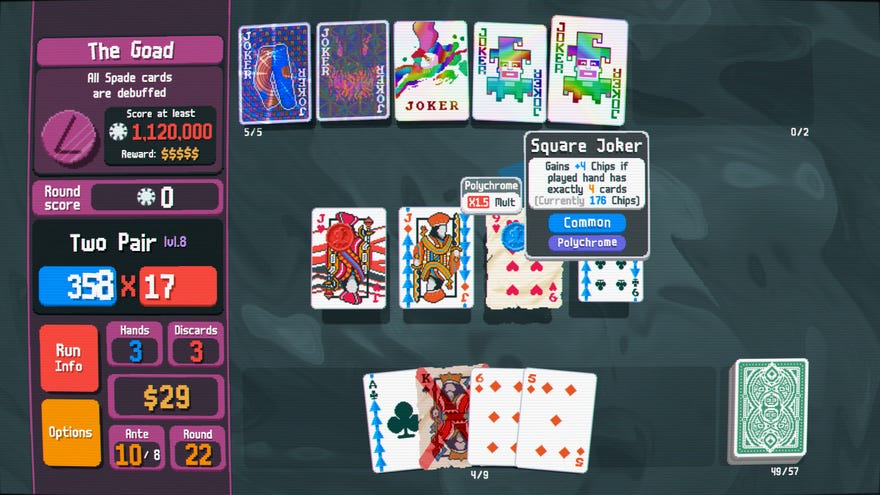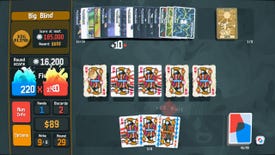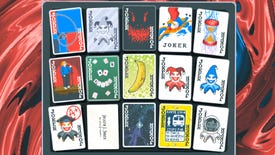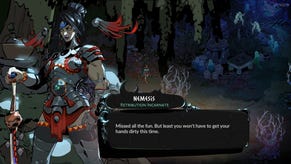Balatro's Endless mode is perfect: a fun victory lap before you extremely die
The only roguelikelike game where I always play Endless
I'm not surprised that I'm playing so much Balatro, because the deck-building poker game is fantastic and it seems just about everyone is playing it. What surprises me is that I'm playing in a way I rarely play roguelikelike games: launching enthusiastically into Endless mode. Turns out, what I want from Endless modes is an end. A brutal and hilariously sudden end.
The first clever touch is presenting Endless as an option at the end of a run. You win Ante 8 (Antes are equivalent to chapters or areas, each with two optional fights then a mandatory boss battle with special conditions), beat the boss, check out your stats, then can bail or continue into Endless. Balatro is not the only game to do this, but too many split Endless off into a separate mode. I don't know in advance if I'll want to keep a run going forever. Maybe I'll want the game to play a little fanfare, declare me the winner, then send me home. Not that I've ever not wanted to continue a Balatro run, mind. I need to open up the throttle on the machine I've built and see what it can do.
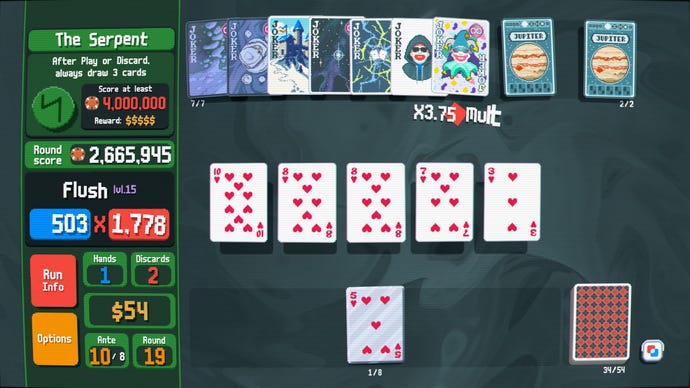
Balatro is only briefly a game of poker. The very first round, before you buy anything, is unadultered poker hands scoring points. Then Balatro becomes a game of cheating at poker by stacking your deck with extra cards, adding multipliers, upgrading hand scores, and giving yourself special powers. You can get quite far in Balatro by playing it as a game of cheating at poker, maybe even win a run, but really this too is a phase. Balatro's endgame is building and upgrading a machine to generate big numbers. At this point, cards are mere fuel. Their abstract power as poker cards doesn't matter, only whether this number is the right octane for this particular run's engine—and you'll have spent several Ante levels stacking the deck with the numbers you need, removing numbers you don't, gaining ways to dig for the good numbers, bedazzling those numbers with foil and seals, and so on.
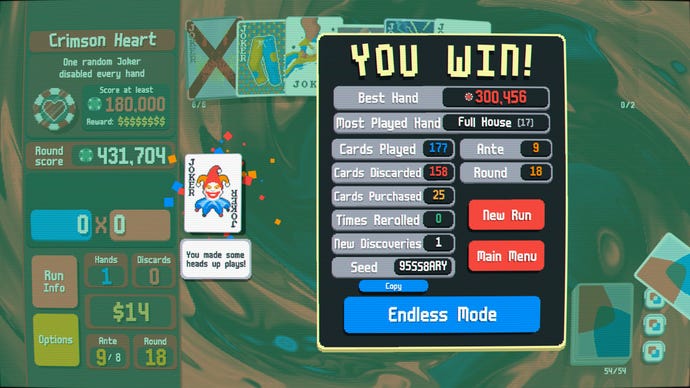
The official end of a Balatro run comes at about the point you've built a strong test model of your number machine and enjoyed generating some big numbers, numbers which are big and good enough for the game to play a little fanfare and tell you that you're very clever. The button offering to enter Endless is Balatro then asking you: "What do you say we let this beauty rip and see how much further she can go?"
The best part is that the probable answer is: "A bit further, but not much."
Endless modes in too many games stretch endlessly into tedium, letting you easily outscale the challenge and leave you just watching colourful stuff happen without feeling threatened. Watching colourful stuff happen can certainly be nice—colours and moving shapes are two of the main strengths of video games—but it gets boring. This is not Balatro. Score requirements in Endless Balatro starts to scale exponentially and aggressively.
Ante 9 has a base score requirement that's 220% of Ante 8's, which might sound big but does honestly often feel like a victory lap. How lovely to be declared the winner then spend a few more hands with my bespoke numbermaking machine! Ante 10 starts at 509% of Ante 9, which is certainly challenging but rewarding to conquer. What a treat to hear my machine trill tick-ding-tick-ding-tick-ding-tick-ding-tick-ding-ding-ding-dding-dddding-ddddding-tring-tring-ttrrring! a few extra times! Then I hit Ante 11 and suddenly the base score is 1285% of Ante 10's and I often fall here. And Ante 12 is 4166% of 11 and... I've never passed that 300,000,000-point hurdle. Requirements scale even higher on higher difficulty levels too. But I'm happy with the point where I die. I'm not so seriously into numbermaking that I particularly want to watch a machine run itself forever. I had fun playing poker, then I had fun cheating at poker, then I had fun building a machine, then I won the game, and then I went a little further and tinkered with my machine a bit more before being annihilated by colossal, uncaring numbers. Lovely.
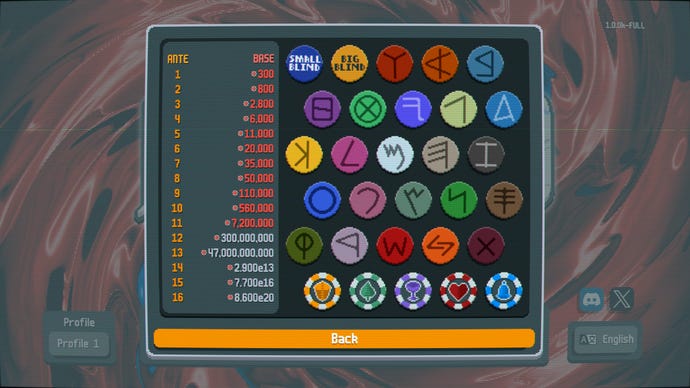
The ability to play a little further after winning feels educational too, because you discover the point where even a winning deck fails. You come to see quite how over-reliant on discards it was, how deep you had to delve, how slowly it scaled, which scaling elements fell off, which adornments might have better suited your cards, the jokers that didn't contribute enough. It pats me on the back, calls me a winner, then schools me. I've learned more about building powerful Balatro decks from post-victory Endless play than I have from beating the 'final' boss.
Balatro's creator has said they feel part of why the game is so successful is because they've barely played other deckbuilders, and came at it without genre conventions and expectations. Endless mode being fun is certainly a welcome break from the norm.
Balatro is out now on Steam, priced at £13/€14/$15. See our Balatro review for more on the game Katharine called "a generous and mesmeric take on poker with endless strategic possibilities."
